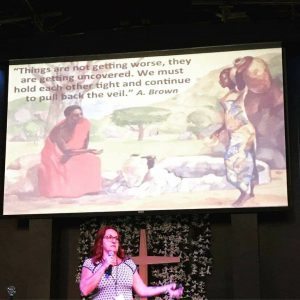The Persistent Preacher: The Samaritan Woman at the Well as a Model for a Nevertheless Homiletic

 Among the outstanding presenters at “Nevertheless, She Preached” was Rev. Dr. Karoline Lewis, an ordained Lutheran pastor and Associate Professor of Biblical Preaching at Luther Seminary. She is the author of SHE: Five Keys to Unlock the Power of Women in Ministry and John: Fortress Biblical Preaching Commentaries.
Among the outstanding presenters at “Nevertheless, She Preached” was Rev. Dr. Karoline Lewis, an ordained Lutheran pastor and Associate Professor of Biblical Preaching at Luther Seminary. She is the author of SHE: Five Keys to Unlock the Power of Women in Ministry and John: Fortress Biblical Preaching Commentaries.
In a column for Working Preacher she writes about “Nevertheless, She Preached”:
“A grassroots event, dreamt by two female Baptist preachers who saw and heard a need and did something about it. In only five weeks, they recruited speakers, musicians, and helpers to make their dream come true. They did it with their connections and selling t-shirts. They did it with taking risks. They did it with the sure and certain hope that God’s Spirit would show up. And she did. And the conference happened. And it was extraordinary—a testimony to the kind of resistance, vigilance, and persistence that is essential for how we do church these days.”
Rev. Dr. Lewis’s presentation was titled “The Persistent Preacher: The Samaritan Woman at the Well as a Model for a Nevertheless Homiletic.” She begins by naming an “unauthorized reformation in homiletics” that’s been going on for some time, but has been ignored and silenced. This reformation preaching “gives witness to experiences of God, what Scripture itself says about preaching.” She continues to proclaim: “The Good News is the presence of God in our midst. Preaching should be about encounters with God, not lessons on texts or theology.”
 Such divine encounters often lead us to expose social injustices and resist them. Rev. Dr. Lewis quotes from adrienne maree brown’s “Living Through the Unveiling”: “Things are not getting worse, they are getting uncovered. We must hold each other tight and continue to pull back the veil.” Brown delineates many injustices currently being uncovered, including white supremacy, denial of climate change, racial profiling, abuse of women of color and poor women. She wrote this blog in February of 2017. It brings to mind also the recent “Me too” campaign on social media where millions of women all around our country have come forward with stories that uncover the pervasive evils of sexual harassment and sexual assault. And after the latest horrific mass shooting in our country, the connection between domestic violence and mass murder continues to be uncovered.
Such divine encounters often lead us to expose social injustices and resist them. Rev. Dr. Lewis quotes from adrienne maree brown’s “Living Through the Unveiling”: “Things are not getting worse, they are getting uncovered. We must hold each other tight and continue to pull back the veil.” Brown delineates many injustices currently being uncovered, including white supremacy, denial of climate change, racial profiling, abuse of women of color and poor women. She wrote this blog in February of 2017. It brings to mind also the recent “Me too” campaign on social media where millions of women all around our country have come forward with stories that uncover the pervasive evils of sexual harassment and sexual assault. And after the latest horrific mass shooting in our country, the connection between domestic violence and mass murder continues to be uncovered.
Biblical misinterpretations continue to support our patriarchal culture and the resulting violence and injustices. Rev. Dr. Lewis calls for preaching that corrects interpretations of biblical passages “that have had a negative hold on women, that confuse the voice of the author of the biblical texts with the voice of God.” One of these misinterpreted texts is John 4:5-42, the story of the Samaritan woman at the well. She is often misinterpreted as a woman of loose morals. In a Commentary on this passage Rev. Dr. Lewis writes that the Samaritan woman has been misinterpreted as a “five-time loser” and a “passive recipient of Jesus’ offer.” She corrects this misinterpretation, illustrating that the Samaritan woman actively engages in theological conversation with Jesus and then in witnessing to her community.
At the “Nevertheless, She Preached” event, Rev. Dr. Lewis demonstrates that the story reveals the resistance, vigilance, and persistence of the Samaritan woman at the well. “Where do we resist?” she challenges. “Before there can be persistence, there has to be resistance and vigilance.”
Resistance involves truth-telling, Rev. Dr. Lewis declares. We have to uncover injustices in order to resist them. By choosing to go to Samaria and speaking with a woman who is a religious and political outsider, Jesus uncovers prejudices and illustrates the extent of the “world” that God loves (John 3:16). The Samaritan woman resists religious and gender societal barriers and engages Jesus in deep theological conversation.
Vigilance is not about answers but questions. Rev. Dr. Lewis emphasizes the importance of openness to questions, of awareness of the possibility of revelation, and of engaging in conversations about faith. Although marginalized because of her religion and gender, the Samaritan woman exercises her agency and challenges Jesus: “You are a prophet. I have theological questions for you!” In her Commentary on this passage, Rev. Dr. Lewis writes: “The woman at the well shows us that faith is about dialogue, about growth and change. It is not about having all the answers.”
Persistence comes when we actually say something out loud. Rev. Dr. Lewis continues: “The first revelation of ‘I Am’ is to a woman.” She responds to ‘I Am’ by speaking her witness. Without all the answers and in spite of her marginalized status, she nevertheless persists in advocacy. She leaves her water jar behind and says, “Come and see.”
YES, that is very Hopefull. Thank you thank you!!! Keep going, we’re lifting the veil!
Yes, keep lifting the veil! Thank you for all you’re doing to uncover the truth!